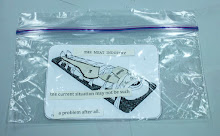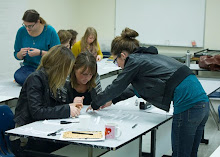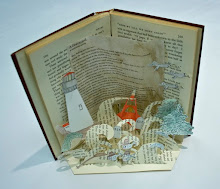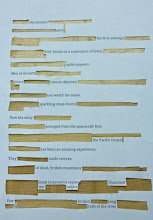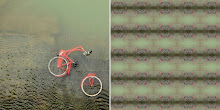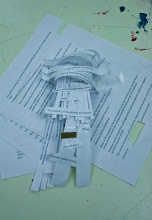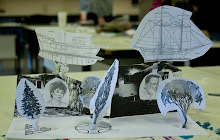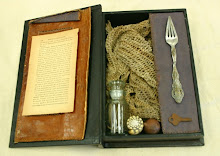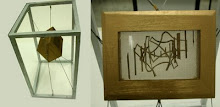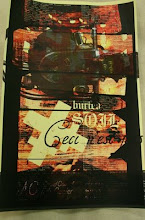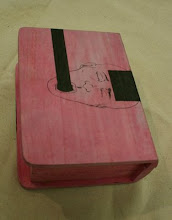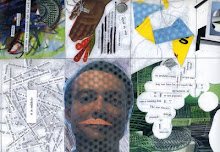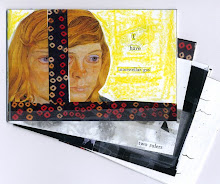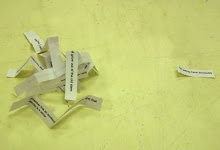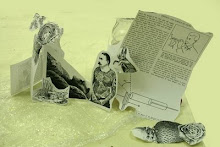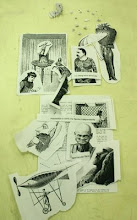Fishing for a Story
Love Song (Wounded Tree)
Open Endings
Music on a String
Word Processor Pi-->ñata
The class, or most of it
VVP: Art 434 & Engl. 410
- Dan Callis and Chris Davidson
- Website for Vision Voice and Practice: An Interdisciplinary Course in Art and Creative Writing
Sunday, October 28, 2012
Thursday, May 31, 2012
Wes Anderson and Joseph Cornell
Cornell, a mainstay of this class, gets a shout-out in Anthony Lane's elegant, even moving, review of Moonrise Kingdom:
[Anderson] is often spoken of as an arch-geometrician, drawn to cinema by the orders of symmetry that it allows him to impose. However, when I watch those graceful sideways tracking shots of his--through the Bishop residence, at the start of the new film, or along the train carriages, at the end of "The Darjeeling Limited"--what I sense is not a technical tic but a pressing need to bind people together even as they threaten to pull apart. (Anderson's parents, we may note in passing, divorced when he was eight.) Certain makers of musicals, like Stanley Donen and Vincente Minelli, were fêted or decried for their organizational verve and a fetishistic appetite for color; only with time did it emerge that what they sought was a shape for emotional longings, and that could happen here, too. Who knows, we may look back on Anderson's works as we do on the boxes of Joseph Cornell--formal troves of frippery, studded with nostalgic private jokes, that lodge inexplicably in the heart.
- from this week's New Yorker (the science fiction issue)
Monday, May 28, 2012
Individual Practice - Robert Kirkendall
from "Five Exempla"
1. The Young Man and the Dog
1. The Young Man and the Dog
There was once a young man enrolled in college near his hometown. His parents had friends from church, an older couple, who one day decided, “We are going on vacation to Hawaii. We have never been, and it is high time we got away.” This family asked the young man’s parents if he would take care of their dog. The young man’s parents explained that he could help himself to food from the fridge and stay in their house overnight. It would be like a vacation for him, too.
The young man agreed. The old couple would be gone for two weeks. He fed, walked, and played with the dog daily. He helped himself to food and slept in their bed. He attended daily classes at his college, a five minutes’ drive.
Two weeks passed and the young man’s parents called. “They have decided to stay for another week. They have never been on such a vacation in their lives. They deserve it.”
He stayed another week. He fed and walked and played with the dog. He relaxed with the dog and the TV in the evenings. Summer was coming, and the dog began to shed. Every night he nudged the young man for scratches and pats, then retreated to a corner to sleep.
His parents called after that week. “They are staying for another week. They really need rest. They have invested so much. They are sending you a check, enough for groceries and a bonus.”
So the young man stayed. The dog slept a lot. It became less hungry and would not finish its food. It began to drag behind on walks, and the young man would have to tug him forward with the leash. The dog stopped nudging for scratches and pats, and just slept in the corner.
His parents called again. The couple was staying for another week. By this time, the dog was not getting out of bed or eating and would not go for walks. The young man and his parents finally took the dog to the veterinarian. “The dog has cancer,” the veterinarian said. “It is in its final stages. He needs to be put down.”
The dog was put down. The old couple never left Hawaii.
Individual Practice - Rachel Kudron
from "Unbecoming"
"I hate men! All of them! In all of their different shapes, sizes, and occupations!" My best friend, Stephanie, yells into the receiver. "I mean would it kill them to call or text of send a friggin' smoke signal three days after a date?"
"I take it Mr. Mark James isn't on your good list right now, is he?" I ask as I try to refrain from smiling.
"NO! He won't see that list for a very long time!" She sounds really beaten up about this.
"Listen, I'm sure he's been busy. Don't take it to heart. Look, I gotta go. Love ya."
"Yea, love you too. Later." The line goes dead.
I place my phone back in my purse that sits, waiting, in my shopping cart. I absentmindedly walk through the aisles half looking for canned green beans and half just enjoying being out of the house. It's been so long since I've been out on my own. Mom thought it would be too hard on me; that everyone would stare at my scars. But I just don't care. I'm just happy to be alive. And out.
As I pull into aisle eight, I see the canned corn, then the canned peas. The green beans must be next. Then I feel my cart crash into something. Just before the flashbacks can start, I duck my head, apologize to whoever or whatever I hit, and rush out of the aisle.
I turn the corner, and start to catch my breath. Maybe I should just leave. I examine my cart. I have almost everything I came or, plus more than I intended to get. And I don't really need green beans. I don't even like green beans. I look over my cart one more time. Yea, I'll just go.
"I hate men! All of them! In all of their different shapes, sizes, and occupations!" My best friend, Stephanie, yells into the receiver. "I mean would it kill them to call or text of send a friggin' smoke signal three days after a date?"
"I take it Mr. Mark James isn't on your good list right now, is he?" I ask as I try to refrain from smiling.
"NO! He won't see that list for a very long time!" She sounds really beaten up about this.
"Listen, I'm sure he's been busy. Don't take it to heart. Look, I gotta go. Love ya."
"Yea, love you too. Later." The line goes dead.
I place my phone back in my purse that sits, waiting, in my shopping cart. I absentmindedly walk through the aisles half looking for canned green beans and half just enjoying being out of the house. It's been so long since I've been out on my own. Mom thought it would be too hard on me; that everyone would stare at my scars. But I just don't care. I'm just happy to be alive. And out.
As I pull into aisle eight, I see the canned corn, then the canned peas. The green beans must be next. Then I feel my cart crash into something. Just before the flashbacks can start, I duck my head, apologize to whoever or whatever I hit, and rush out of the aisle.
I turn the corner, and start to catch my breath. Maybe I should just leave. I examine my cart. I have almost everything I came or, plus more than I intended to get. And I don't really need green beans. I don't even like green beans. I look over my cart one more time. Yea, I'll just go.
Individual Practice - Jenna Guthmiller
from "Awake"
A light flickered. Her green eyes opened and she found herself staring at a gray sky. “Where am I this time?” she thought as she partially sat up, reclining on one slender forearm and brushing her brunette bangs back. A quick glance around her at the dilapidated, graffiti-covered warehouses looming overhead revealed the answer.
Her eyes welled up and her heart sank. “Crap, not again. Why am I here? How long has it been?” As she took a deep, wracking breath to calm herself, the girl’s mind involuntarily flipped through her memories of that place in quick succession. Waiting on a black swing for her father who never came. Hugging Michayla for the last time. Rubbing an silver, oval locket in her hand.
She quickly pulled her legs under her and stood, a wry smile on her face. The girl recalled that she was known here as Raelyn. “I always did like that,” she thought. “but somehow it still doesn't seem to quite fit.” A light flickered. She glanced at the sky wondering if she had seen a flash of lightning but the sky was peaceful.
Sucking in and releasing another big gulp of air, Raelyn began to wind her way in between the buildings toward the heart of the swarming city. Her only option was to visit Lena, a middle-aged woman who lived in an apartment overlooking some local shops. “As much as I hate going to see her,” Raelyn thought, “she’s helpful when it comes to figuring out how long I’ve been gone and where I can find Evey. Lena is the one thing that remains constant. Well, there’s nothing for it. I am here.”
Screwing her face up into a sort of smile, Raelyn knocked. Almost as if she had known exactly when Raelyn would arrive, Lena slid the noisy deadbolt back, flung open the door, and pointed her cane, which she didn’t really need, at Raelyn. “Where in the world have you been for so long this time?” she demanded.
“Ooh, she is not happy. Not happy at all,” Raelyn silently noted. To Lena she replied, “I… well, let’s just say it’s the same old long story, shall we? May I come in?” A light flickered. Raelyn glanced over Lena’s shoulder into the shabby apartment and stared fixedly at the unlit dining room chandelier.
“That is completely unnecessary,” Lena retorted, pulling Raelyn out of her trance.. “You are just here to find out where that girl is. If she’s really your best friend why do you go running off on her like that?” Shaking her head, she continued, “Kids these days, so ridiculously irresponsible. Next time you got a hankering’ to go away for nearly two years you might want to, oh, I don’t know, tell her before you just disappear. Anyways, you should be able to find her at the same place. She hasn’t moved since you up and vanished.” With that she poked Raylen’s belly with the cane. “Go on now.”
Raelyn smiled in relief and made her way to the subway station, boarded a train, and got off after a few exits. "I can't wait to see Evey. She is the one of the only good things about this place. Everything else is just...painful," she mused as she walked two blocks over to the right and entered and older building.
Individual Practice - Zach Mendelson
King of Insects
Stylus-like fingers style like stingers—
Twisted fists twist bits; twist tattered tips to fits,
Inebriating yet alleviating.
A contamination of dreams,
Very similar to verisimilitude.
Reaper
Calcareous caulking,
Carelessly calling,
Barely balking,
Bury us
Bawling
Angler
The facetious transition,
Is a faceless transmission.
And one finds no shame,
In this selfish ambition;
This fashion for fishing.
Individual Practice - Jasper Biggs
Memo
The sun set as Alfred struggled to unlock his front door with shaking hands. He could hear the parakeet calling from inside. Did he feed her today? He couldn’t remember. He didn’t really remember having a parakeet, but then again, there were a number of things he didn’t remember. He tried another key as he pushed his glasses further up his nose. He set down his bag and tried to steady his hands. Finally, the lock clicked and the door opened. He walked inside and turned on the lights. After making a cup of chamomile tea, he made his way upstairs and went to bed. The following morning, he went out to get the paper. There was a bag beside the door. He took a look around to see if anyone had recently left it and then, concluding that it had been left for him during the night, he excitedly brought it inside. Alfred emptied the bag one item at a time onto the kitchen table. Whoever left this gift knew him very well. He decided to arrange the things around his living room. The lava lamp would look nice above the mantle. His dear Martha—God rest her soul—would have loved its purple globs floating around in the amber liquid. The navy sweater was just his size, and not only that, but it had a line of elk along the front. He smiled in delight as he hung it up. There was also a single place setting’s worth of brown stoneware dinnerware. It perfectly matched his other dishes, and as he placed them in the cabinet, he realized that made a complete set. Once again, the giver had known exactly what he needed—he had been one place short. At the bottom of the bag, he found a number of old books and some records by Frank Sinatra. He placed the books with some others on a shelf and started one of the albums. With that, he put on his hat and went for a walk. The sun was just setting when Alfred unlocked his front door with shaking hands. He walked inside, sat down and turned on the news. As he fell asleep, the anchor described a mysterious thief targeting antique stores. Among the recently stolen items was an elk sweater, a lava lamp, a number of other strangely unrelated odds and ends, and a yellow parakeet.
Individual Practice - Dan Fawcett
Car Keys
He's treated me poorly all these years. Stuffing me into his pocket - with the lint! I'll snap in half next time I'm in the ignition.
~
Duct Tape
They really screwed up this time. Punching a hole in the side of the universe isn't an easy fix. But I always patch everything up.
~
He's treated me poorly all these years. Stuffing me into his pocket - with the lint! I'll snap in half next time I'm in the ignition.
~
Duct Tape
They really screwed up this time. Punching a hole in the side of the universe isn't an easy fix. But I always patch everything up.
~
Melpomene mused more morosely.
“My maidens and menservants cannot
make me merry,” she cried melodically.
“Was that a minor key?” I thought.
I held my hand behind my ear. “It has to be.”
I listened, but surprisingly she did not.
I stretched my ear close, yet what I heard
Was wild and weird. It was not
Her normal, melancholy dirge.
“My mythic metaphors miss the mark.
I wish for inspiration.” And then two worlds merged.
“Mortal,” she meant me, “I want something dark.”
Could a more morbid command be given?
For the most malefic art.
To implant ideas in the mistress of depression?
- Dan Fawcett
Individual Practice - Emily Roulund
Burdened Shoulders
I walk through the streets
Carrying bags of stones on my shoulders.
Every now and then, they force me to my knees.
I cannot bear their weight long.
My bones are weary,
My shoulders bruised and cut
By the sharp corners of the rocks against my skin.
My knees - they are scarred, scraped and muddy,
And the wounds are filled with pebbles glued in with dried blood.
The ground is unforgiving.
I walk through the streets
Carrying bags of stones on my shoulders.
Every now and then, they force me to my knees.
I cannot bear their weight long.
My bones are weary,
My shoulders bruised and cut
By the sharp corners of the rocks against my skin.
My knees - they are scarred, scraped and muddy,
And the wounds are filled with pebbles glued in with dried blood.
The ground is unforgiving.
Friday, May 25, 2012
Individual Practice - Mary Kate Reynolds
My name is Judas
If you have the choice
between immortality and a heart--
choose heart.
And if the cost of singing like the angels
comes through an instance of petty treachery--
pluck out your tongue.
When the beauty of the gods
comes to take you away,
run to the graveyard,
and live your life in ashes first.
You choose to walk away.
Choose, you insufferable blessed.
Choose that dishonored road,
soaked with love's blood at every step.
Love? I've never let it touch me since.
If you have the choice
between immortality and a heart--
choose heart.
And if the cost of singing like the angels
comes through an instance of petty treachery--
pluck out your tongue.
When the beauty of the gods
comes to take you away,
run to the graveyard,
and live your life in ashes first.
You choose to walk away.
Choose, you insufferable blessed.
Choose that dishonored road,
soaked with love's blood at every step.
Love? I've never let it touch me since.
Individual Practice - Jennifer Ross
Accessory Cloud
When I look at the sky I see my mother's pie
Next to the pie, a glass of ice-cold milk
One week without my mom's cooking
I was at summer camp
Bugs in my bunk bed--
I hid in my sleeping bag
I brought lots of candy with me--
Without candy I would go crazy
With candy I get high
Giggles and stomach-grabbing churkles
My whole body jiggles
I could as well be Santa Claus
Egg product for scrambled eggs
Pancakes, supposedly cooked there on the stove
Taste like they came out of the microwave
Times like this I miss my mother's cooking
When I look to the sky I see her face grinning over me
Her heart a warm cinnamon roll
When I look at the sky I see my mother's pie
Next to the pie, a glass of ice-cold milk
One week without my mom's cooking
I was at summer camp
Bugs in my bunk bed--
I hid in my sleeping bag
I brought lots of candy with me--
Without candy I would go crazy
With candy I get high
Giggles and stomach-grabbing churkles
My whole body jiggles
I could as well be Santa Claus
Egg product for scrambled eggs
Pancakes, supposedly cooked there on the stove
Taste like they came out of the microwave
Times like this I miss my mother's cooking
When I look to the sky I see her face grinning over me
Her heart a warm cinnamon roll
Individual Practice - Christian Bearup
The Liturgical Scent of Polycarp
+++
Son of God adopted,
Odor of procession,
Greeting death, a rival,
Greeting censer, silver,
Bind yourself to swinging
Tomb of scented triumph.
+++
Flame eat fire--God eat sinner!
Host of Christ--skin like timber!
Coals are hot--man won't die--
Sword in side.
Blood of saint--blood or wine?
+++
My patron came and said to me,
"Your flesh is wounded, cruciform."
My devil came and said to me,
"From flesh let blessed soul be torn."
+++
Son of God adopted,
Odor of procession,
Greeting death, a rival,
Greeting censer, silver,
Bind yourself to swinging
Tomb of scented triumph.
+++
Flame eat fire--God eat sinner!
Host of Christ--skin like timber!
Coals are hot--man won't die--
Sword in side.
Blood of saint--blood or wine?
+++
My patron came and said to me,
"Your flesh is wounded, cruciform."
My devil came and said to me,
"From flesh let blessed soul be torn."
Wednesday, May 23, 2012
Poem In Conversation with Joseph Cornell
This poem, by student Robbie Kirkendall, was written for two voices. Classmates Candace Arce-Lindsay and Juliet San Nicolas read it in class last week.
Monday, May 21, 2012
Friday, May 11, 2012
Thursday, May 10, 2012
Image Text Collaboration
The students were required to create a work that combines text and image with image to be privileged. They were to organize the work around the primary delivery structure or site of authority of image, ie, picture plane (canvas, photo paper, design field) or sculpture. The images and text could be their own or found.
Monday, April 30, 2012
Tuesday, April 24, 2012
Spot Collaboration: Writing
Students were broken into groups of three and given a line of text, either from Frank O'Hara or Dietrich Bonhoeffer. (Yes.) The students then had to add three lines to that line to make some sort of poem-like thing. When finished, the groups had to switch poems with each other and perform three "actions" on the poem they now had before them. This could mean adding lines, striking words, changing syntax, etc. After finishing these actions, the groups switched poems again and then performed three actions on the newly modified poems. Then each group read the product they had in their possession. Below are the results.
~
Cars are as I AM--
waiting.
And even the traffic halts
So thick is existence.
The looming sound of the passing train disrupts my thoughts
As the sun peers around the sky scraper.
Time is raging on.
~
I don't play this game very well.
I've no sympathy with attempts.
Distress creates problems too big to be solved by pleasantries.
So instead, I won't explain away distress.
~
I hope you have a chance to see
the city again.
It is a shame--
it must be damn tranquil. So
I wish you back soon.
With my illness I am unable
to see you again.
~
Even the stabbings are causing the population explosion. I have been irreversibly wakened from slumber. I cannot fathom the beauty of my destruction, which is not destruction but a dream of blue turtles.
~
I take in
I can listen
But add nothing
I find nothing to say
In this place
Wind whistles
And that's it
~
And the park's full of dancers
with their tights and shoes
hanging from trees, darkened fruits.
The air holds lifeless birds.
The End
~
Cars are as I AM--
waiting.
And even the traffic halts
So thick is existence.
The looming sound of the passing train disrupts my thoughts
As the sun peers around the sky scraper.
Time is raging on.
~
I don't play this game very well.
I've no sympathy with attempts.
Distress creates problems too big to be solved by pleasantries.
So instead, I won't explain away distress.
~
I hope you have a chance to see
the city again.
It is a shame--
it must be damn tranquil. So
I wish you back soon.
With my illness I am unable
to see you again.
~
Even the stabbings are causing the population explosion. I have been irreversibly wakened from slumber. I cannot fathom the beauty of my destruction, which is not destruction but a dream of blue turtles.
~
I take in
I can listen
But add nothing
I find nothing to say
In this place
Wind whistles
And that's it
~
And the park's full of dancers
with their tights and shoes
hanging from trees, darkened fruits.
The air holds lifeless birds.
The End
Monday, April 23, 2012
Individual Projects: Writing
Every Seven Years
I'm gonna to go down to the river. It's a long walk and I've got to start now. I'm gonna muster my weary soul and make my feet take me there. The river's gonna be running in full flush now, as heavy and swollen as a woman with a child in her belly. The woods are gonna be green. Green and buzzing with all manner of life. This time of year, you can sit and see the trees reaching higher and higher for the sky. I'm taking all the books with me. I've got 'em packed all in a case. I'm gonna set 'em free. Gonna take 'em down to the river.
Gonna spread 'em out on the riverbank. They're gonna open themselves up to the air, to the waves, to the sand, to the light. Books got to be aired out every now and then. The good in 'em gets stale, else. I'm gonna open 'em up and then wade out in the river. I might lie down. Might try to get clean. Might try to get right with God. All those books I've read. Let the current take the words right out of me. Let the sun bleach the pages blank and clean. Gonna spread 'em out on the riverbank.
They tried to keep 'em hidden, tried to keep 'em dark. But I found 'em. I found 'em in that old house I live in now. They were packed away up in the attic and away down in the cellar. The boxes weren't even marked right. But I went up the stairs, searching for clean air, and I found the books. I went down the stairs, searching for some quiet, dark place, and I found the books. I brought 'em out. I cared for 'em. I healed their hurts and mended their broken backs. And now it's my turn. Those pages, my how they will flutter and fly. That ink's gonna run a trail of tears into the river. They tried to keep 'em hidden, tried to keep 'em dark.
That water's getting stained with all those things. The ink's running out of the books now. Each book a river. Each book adding to the river. The ink's running out of my skin now. I'm stained inside. Those books, they get into your blood. They get under your skin. They turn into your hair and eyelashes and the bits of your fingernails that you bite off and spit out. They say your body gets made new every once in a while. I don't know. I'm gonna keep on putting books in the river. I'm not trying to hide 'em, just making things free. That water's getting stained with all those things.
That water's getting stained with all those things. The ink's running out of the books now. Each book a river. Each book adding to the river. The ink's running out of my skin now. I'm stained inside. Those books, they get into your blood. They get under your skin. They turn into your hair and eyelashes and the bits of your fingernails that you bite off and spit out. They say your body gets made new every once in a while. I don't know. I'm gonna keep on putting books in the river. I'm not trying to hide 'em, just making things free. That water's getting stained with all those things.
- Jayne Meyncke
Saturday, April 14, 2012
The New Aesthetic and Its Discontents
The past few weeks I have encountered several posts online pertaining to something called "The New Aesthetic," hastened by a panel discussion on said phenomenon at South by Southwest. (One response began, "Is the New Aesthetic a thing?") Reading over these responses, and checking out the related tumblr, got me thinking about this class. I'm most interested in this essay, which seems to speak to the moment in its larger context. Is there a connection to what we're doing here? What do you think?
Saturday, April 7, 2012
Paying Attention and Meaning
A couple weeks ago, we read an essay by Charles Tomlinson called "The Poet as Painter," and a number of things he wrote seemed relevant to this class, such as this:
Cezanne himself was very conscious of [a] problem problem for the painter--how to reconcile sensation and form without bullying your picture into a wilful unity, a triumph of personality at the expense of a truth to relationship.
But how to do this? I think the main way is by paying attention, to listening and looking:
I think, once more, of Wallace Stevens, and that entry in his Adagia which reads: 'The aspects of earth of interest to a poet are the casual ones, as light or colour, images.' By 'casual', I take it that he refers to the fortuitous nature of art--the way one may find its deepest meanings on a dull street corner, in an old pair of shoes, in the chance conjunction of the totally unforeseen and apparently unrelated. Suddenly things knit up--the canvas joins hands, in Cezanne's words. You cease to impose and you discover, to rephrase another aphorism of Stevens. And you discover apparently by chance. But what is chance? And if one accepts it, does it not cease to be chance?
Which brings me to Elizabeth Bishop. The students have been looking at Frank O'Hara's poems, which certainly exist in the fortuitousness Tomlinson talks about, especially as O'Hara moves through the city, picking up and putting into his poems snatches of conversation, proper names, and sensory perceptions that come flitting into his ever-roaming mind. This past Thursday, before we discussed O'Hara's poems, I read the following passage by Bishop, on the poet's "material":
i.e., immediate, intense physical reactions, a sense of metaphor and decoration in everything--to express something not of them--something I suppose spiritual. But it proceeds from the material, the material eaten out with acid, pulled down from underneath, made to perform and always kept in order, in its place. Sometimes it cannot be made to indicate its spiritual goal clearly (some of Hopkins, say, where the point seems to be missing) but even then the spiritual must be felt. Miss Moore does this--but occasionally. The other way--of using the supposedly "spiritual"--the beautiful, the nostalgic, the ideal and poetic, to produce the material is the way of the Romantic, I think, and a great perversity.
(The essay I gleaned this from can be found here.) We've been discussing all semester how to listen to the material, how to let it tell you where to take it, and something about re-reading O'Hara brought the above passage to mind. After reading it, I read my favorite of Bishop's poems, "At the Fishhouses," a poem that seems to nearly perfectly illustrate this process of paying attention giving way to "meaning."
Monday, April 2, 2012
Text Image Collaborations








Working in three-person collaboration teams the students created a visual work that combined text and images in which text was to be privileged. They were to use the primary delivery structure or site of authority for text, ie, book, magazine, broadsheet, etc. as a structural consideration fort the new work.
Sunday, March 25, 2012
Monday, March 12, 2012
Cross-Genre Projects



works by Juliet San Nicolas
My purpose with the cross-genre piece is to visually represent the tone of Marianne Moore's poetry. All her poems have a strong calm about them, they also have a strong focus on the particulars that she sees in the world around her. And so I spent three hours reading her poems aloud, then wandered around my house, trying to see the world with her voice. After I took the pictures, I narrowed them down to a series of pairs. The pictures are paired together namely in contrast to each other, but also sometimes because of their similarity.
The Story of Sushi
I'm not sure how to think about the following video. It is visually arresting, but I struggle to match up the gravity of its claims with its mode. Watch it yourself and see what you think.
The Story of Sushi from Bamboo Sushi on Vimeo.
Sunday, March 11, 2012
Poem/Video
In my freshman class, students write a literary analysis of a lyric poem. This semester, I gave the students about twenty poems to choose from, and at least half chose "Those Winter Sundays" by Robert Hayden. This poem is "about" an adult's recollecting of his father's acts of domestic kindness, acts he didn't recognize at the time (for reasons the poem implies). It's widely anthologized, and, as my students showed, quickly beloved. Many said they were moved by the poem to consider the ways they didn't recognize their own parents' sacrifices on their behalf. You can read the poem here.
When I looked the video up myself, I noticed that there were a few others centering on "Those Winter Sundays," the most popular--in terms of views--this one, produced by the Poetry Foundation:
In this same freshman class, students sign up for "share day," where they must share with the class an item that relates in some way to the class's themes or goals or tasks. One student showed to us the following video:
When I looked the video up myself, I noticed that there were a few others centering on "Those Winter Sundays," the most popular--in terms of views--this one, produced by the Poetry Foundation:
What's interesting to me is that, in snooping around Youtube, I found all sorts of videos of famous poems, and not just videos of spoken-word artists giving performances, or of poets giving readings. Dana Gioia, who recently gave a reading and a series of lectures at Biola, at one point talked about how, in Europe, 'poetry film festivals' are one means of renewing interest in verse. Whether or not that's true, combining video and poetry offers exciting collaborative possibilities that anyone in this class would recognize.
And this is why I find the second video, above, less interesting than the first. It seems to consider the options of verse/video collaboration, and it chooses the easiest way out. One of the dangers of ekphrastic poetry is its tendency to summarize or literally describe, in lines, its subject. In our reading this week, from this book, Howard Nemerov discusses "some poems of his own time, especially some he cares for, that have a relation with painting and drawing." After referencing poems by Auden, Berryman, and Jarrell, Nemerov writes,
It is not, certainly, that the poems speak about the paintings they refer to; no, for the poems offer relatively bare and selective descriptions; no art student sent to the museum would dare come back with such descriptions which sometimes hardly serve to identify the paintings. No, the poems speak about the silence of the paintings; and where the poet was lucky his poem will speak the silence of the painting; it too will say nothing more than: It is so, it is as it is. The poem, too, when it works, is a concentrated shape illuminated by an energy from within; its opinions do not matter, but it matters. Here, too, he observes, all that happens happens while the poem, like the painting, lies flat on a plane surface, the surface of the page.
Or, in the case of video, the plane surface of the screen. The second video, above, offers one person's (or one committee's) attempt at depicting Hayden's poem, in an ekphrastic way, a 'moving painting' that 'speaks' about the poem it refers to. The video seems to be saying, "It is so, it is as it is." The first video, on the other hand, attempts, in its way, to "speak about the silence of" the poem. Whether or not it succeeds, I leave to you. But it more readily acknowledges that a poem and a video are different modes. We lament that habit of students who see a movie in lieu of reading a book, as if they're the same thing. The Poetry Foundation video seems to reinforce such thinking.
Tuesday, February 21, 2012
In-class collaborations
Friday, February 10, 2012
Varsity Stroke
Marianne Moore, the stringently alive poet and critic whose work we've been looking at the past couple of weeks, was once approached by Ford to name a new car they were marketing in the '50s. Here are some of the names she came up with, all of which were rejected for 'Edsel,' one of the biggest flops in the history of American capitalism. Perhaps it would have succeeded had they gone with "Varsity Stroke."
Friday, January 27, 2012
"The Best Version of the Thing"
SS: I’ve been in situations where I’ve felt like, “We’ve got some work to do,” or “I need to do some more shooting,” or, “I’m going to have to make some tough decisions.” I have an hour of edited material that was cut out of Contagion. I had to make some really, really tough choices there.
AVC: Are you ultimately pleased to make those choices?
SS: Yeah, you have to.
AVC: You’re not someone who’s like, “Well, I want a three-hour cut down the line at some point”?
SS: No, not at all. I’m not precious about anything. The effort it took to get something means nothing to me in post. It means nothing to the audience. I’ll chop limbs off. I’ll put an arm where a leg should be. I’ll do anything.
AVC: But it sometimes means something to the actors and writers, doesn’t it?
SS: Yeah. But, again, everybody, including me, has to submit to what it needs to be. The thing is at the top of the pyramid, the best version of the thing; we all have to serve that. You forget that at your own risk.
- From an interview with Steven Soderbergh
Subscribe to:
Posts (Atom)


,+final.jpg)
















